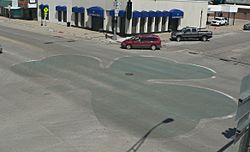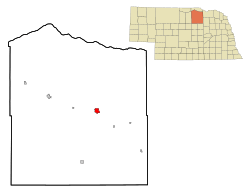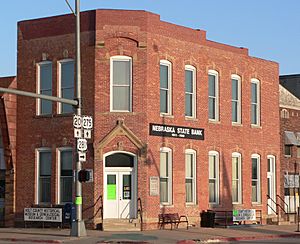O'Neill, Nebraska facts for kids
Quick facts for kids
O'Neill, Nebraska
|
|
|---|---|

Shamrock painted on pavement at 4th and Douglas
|
|

Location of O'Neill, Nebraska
|
|
| Country | United States |
| State | Nebraska |
| County | Holt |
| Incorporated | 1882 |
| Area | |
| • Total | 2.38 sq mi (6.18 km2) |
| • Land | 2.38 sq mi (6.18 km2) |
| • Water | 0.00 sq mi (0.00 km2) |
| Elevation | 2,001 ft (610 m) |
| Population
(2020)
|
|
| • Total | 3,581 |
| • Density | 1,501.47/sq mi (579.61/km2) |
| Time zone | UTC-6 (Central (CST)) |
| • Summer (DST) | UTC-5 (CDT) |
| ZIP code |
68763
|
| Area code(s) | 402 |
| FIPS code | 31-37105 |
| GNIS feature ID | 838176 |
| Website | cityofoneillnebraska.com |
O'Neill is a city in Holt County, Nebraska, United States. In 2020, about 3,581 people lived there. It is the main city and county seat of Holt County. O'Neill is known as the official Irish capital of Nebraska.
| Top - 0-9 A B C D E F G H I J K L M N O P Q R S T U V W X Y Z |
History
O'Neill was first planned out in 1874. It was named after one of its founders, John O'Neill. Many of the first people to settle in O'Neill were immigrants from Ireland.
The town officially became a city in 1882.
Geography
O'Neill covers a total area of about 2.38 square miles (6.18 square kilometers). All of this area is land.
Besides being the Irish capital of Nebraska, O'Neill is surrounded by farms. The main products grown or raised near the town include cattle, potatoes, tomatoes, soybeans, and corn.
Weather and Science
In the summer of 1956, O'Neill was the site of an important science experiment called Project Prairie Grass. This project studied how things spread in the air close to the ground. Scientists from different universities and the Air Force worked together on it. They measured how a special tracer gas moved and how much the air was moving around.
Population Information
| Historical population | |||
|---|---|---|---|
| Census | Pop. | %± | |
| 1880 | 57 | — | |
| 1890 | 1,226 | 2,050.9% | |
| 1900 | 1,107 | −9.7% | |
| 1910 | 2,089 | 88.7% | |
| 1920 | 2,107 | 0.9% | |
| 1930 | 2,019 | −4.2% | |
| 1940 | 2,532 | 25.4% | |
| 1950 | 3,027 | 19.5% | |
| 1960 | 3,181 | 5.1% | |
| 1970 | 3,753 | 18.0% | |
| 1980 | 4,049 | 7.9% | |
| 1990 | 3,852 | −4.9% | |
| 2000 | 3,733 | −3.1% | |
| 2010 | 3,705 | −0.8% | |
| 2020 | 3,581 | −3.3% | |
| U.S. Decennial Census 2012 Estimate |
|||
2010 Census Details
In 2010, O'Neill had 3,705 people living in 1,593 homes. About 970 of these were families. Most people in the city were White. A small number of people were from other racial backgrounds. About 6.5% of the population was Hispanic or Latino.
Around 28% of homes had children under 18 living there. The average age of people in O'Neill was about 42.8 years old.
Arts and Culture
Yearly Events
The two main celebrations in O'Neill are Saint Patrick's Day and Summerfest in July. These events bring the community together.
Local Attractions
O'Neill is home to the world's largest permanent shamrock. It is made of colored concrete and is located at the main intersection of 4th and Douglas streets. The shamrock was put there in the year 2000. Because many cars drive over it, the town repaints the shamrock every year for the St. Patrick's Day celebration.
Education
O'Neill has three high schools for students:
- St. Mary's Catholic School
- O'Neill Public Jr/Sr. High School
- Word of Life Christian School
Media
The local newspaper in O'Neill is called the Holt County Independent.
The city also has a local radio station, KBRX. You can find it on 102.9 FM and 1350 AM. The FM station plays country music and local news. The AM station plays classic rock, and even has a polka music hour in the morning.
Transportation
O'Neill used to have a train line called the "Cowboy Line." This line ran from Norfolk, Nebraska to Chadron. It stopped being used for trains in 1992. Now, this old train line is part of the Cowboy Trail, which is the longest bike trail in Nebraska.
Another train line, which used to be part of the Chicago, Burlington & Quincy company, still serves O'Neill. This line is now run by the Nebraska Northeastern Railway.
Several major highways pass through O'Neill. These include U.S. Highway 20, U.S. Highway 275, and U.S. Highway 281.
Notable People
Many interesting people have connections to O'Neill:
- Clayton Danks (1879–1970), a famous rodeo winner, was born in O'Neill. He was also the model for Wyoming's cowboy symbol.
- Helen Duhamel (1904–1991), a businesswoman and broadcaster, went to St. Mary's Catholic School in O'Neill.
- Father Edward Flanagan, who started Boys Town, was a Catholic priest at St. Patrick's Catholic Church in O'Neill.
- Mike Johanns, a U.S. Senator, began his career as a lawyer in O'Neill.
- Thomas Kearns, a U.S. Senator from Utah, was born in O'Neill. He was important in mining, banking, and railroads.
- Moses Kinkaid, a U.S. Representative from Nebraska, lived in O'Neill. He helped pass the Kinkaid Act, which allowed people to get more land for homesteading.
- Debra Kolste, a member of the Wisconsin State Assembly, was born in O'Neill.
- Frank Leahy, a famous football coach for Notre Dame, was born in O'Neill.
- John O'Neill, an Irish-born officer, led some raids into Canada.
- Harry Owens, a bandleader and songwriter who won an Academy Award, was born in O'Neill.
- Jake Peetz, an assistant coach for the NFL's Seattle Seahawks, is from O'Neill.
See also
 In Spanish: O'Neill (Nebraska) para niños
In Spanish: O'Neill (Nebraska) para niños
 | Aurelia Browder |
 | Nannie Helen Burroughs |
 | Michelle Alexander |


